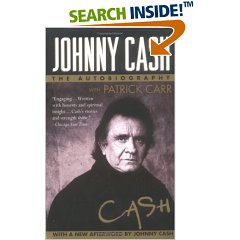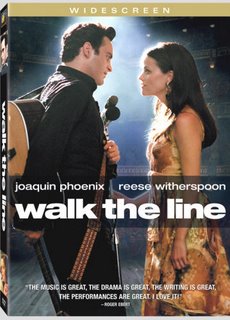"Cash" vs. Cash
VS.
I am a fan of Johnny Cash. I happen to also be a fan of Joaquin Phoenix and Reese Witherspoon. I, however, hated "Walk the Line." I anticipated seeing this film many months in advance, and ended up renting it the first few days after it was released. I was gripped all the way through, and then, pow, it was over....all fall, no redemption.
It took a while for me to even listen to a Johnny Cash album after watching that. I mean, part of the draw to Cash is the "outsider" or "rebellious" aura that surrounds Cash's life, but there is more to the man in black than just the black.
I recently picked up Cash: The autobiography from our public library, and flew through its 300ish pages. This is the literary equivalent to what Cash has created musically since 1955; a collection of stories that cut through the bullshit and "tell it like it is."
The stories alone are interesting, but it is Cash's heart that beats throughout these tales and gives them life. For example, the reader can sense that though Cash loves all his children, he TREASURES the relationship that he has with his only son, John Carter Cash. *As the father of two boys, these stories/passages really hit home*
A critic would (and has) read this autobiography and made comments about how the book feels disjointed, unorganized, and amateurish...but this is what gives the book its charm. The reader gains the sense that he is sitting with Johnny Cash and listening to him tell story after story sitting on his porch in Jamaica, Tennessee, or Florida. You can almost feel the sun shining on your face as you listen to this man share about family, music, faith, pills, fame, love, and friends.
This is the Johnny Cash that the world should remember.
It took a while for me to even listen to a Johnny Cash album after watching that. I mean, part of the draw to Cash is the "outsider" or "rebellious" aura that surrounds Cash's life, but there is more to the man in black than just the black.
I recently picked up Cash: The autobiography from our public library, and flew through its 300ish pages. This is the literary equivalent to what Cash has created musically since 1955; a collection of stories that cut through the bullshit and "tell it like it is."
The stories alone are interesting, but it is Cash's heart that beats throughout these tales and gives them life. For example, the reader can sense that though Cash loves all his children, he TREASURES the relationship that he has with his only son, John Carter Cash. *As the father of two boys, these stories/passages really hit home*
A critic would (and has) read this autobiography and made comments about how the book feels disjointed, unorganized, and amateurish...but this is what gives the book its charm. The reader gains the sense that he is sitting with Johnny Cash and listening to him tell story after story sitting on his porch in Jamaica, Tennessee, or Florida. You can almost feel the sun shining on your face as you listen to this man share about family, music, faith, pills, fame, love, and friends.
This is the Johnny Cash that the world should remember.



2 comments:
I just transcribed an interview of my boss with John Carter Cash about working on the movie. This is what he had to say:
"You know, the movie is about my parents’ love affair. That’s what it’s about. If you look for anything else, you might be lacking. Even if you look for a message about spirituality or their relationship with God...what the movie’s about is their love affair. It tells what they wanted it to tell. If you look for a story of lasting love, you’ll find it. And if you look for anything else, then we’re going to have to make another movie, or make one that’s four and a half hours long."
Krista,
Thanks for your insight and a direct source on Walk The Line's intent. It's unfortunate, though, that even the love affair seemed to play second fiddle to Cash's addiction in the film. Though this is the way things probably happened; I don't feel the film did a good job telling the whole story.
In his autobiography, Cash tells a story of (literally) crawling into a cave to die and June coming and searching for him, that she "had a sense" that he was there. I got the feeling throughout the movie that not only did the filmaker's telling of Cash's life and music suffer, but so did the love affair. I didn't get the sense that this love was an undying one.
I remember a Rolling Stone interview with Johnny sometime shortly after June's death, and it was then that I thought, "I hope I can express that much love for JoAnna in 50 years."
Walk the Line fell short of that mark by far.
Post a Comment